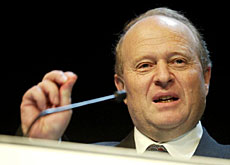
Open borders make Norway “more secure”

Norwegian membership of the European Union’s Schengen/Dublin accords has led to a strengthening of security, according to the country’s justice minister.
But in an interview with swissinfo, Odd Einar Dørum said it was up to the Swiss to decide whether it was also in their interests to sign up to the treaties.
Earlier this year opponents of closer ties between Switzerland and the EU forced a nationwide vote on Schengen/Dublin, part of a set of bilateral accords signed in 2004.
The treaties, which govern closer cooperation on crime-fighting and asylum, are due to be put to the electorate on June 5.
Norway joined Schengen/Dublin in 2001 and Dørum believes the Norwegian police have since been better equipped to deal with organised crime.
Norway is one of the few countries outside the EU to join the passport-free Schengen zone and sign up to the Dublin accord on asylum cooperation.
To the east it shares common borders with Sweden and Finland. It has had a special agreement with both countries under the Nordic Passport Union for more than five decades.
A 196km stretch in the Arctic Circle forms Europe’s northernmost border with Russia.
Dørum, a member of the liberal Venstre Party, initially served as transport and communications minister before taking on the justice and police portfolio in 1999 for the first time and again in October 2001.
swissinfo: Has Norway really become more secure as a result of joining Schengen/Dublin?
Odd Einar Dørum: It has become more secure because we are cooperating in a very efficient manner with other European countries to fight international organised crime.
We also find out very quickly if a person has applied for asylum in another country in the Schengen area before coming to Norway.
swissinfo: What impact have the Schengen/Dublin accords had on the crime rate and the number of arrests in Norway, and how have they affected asylum figures?
O.E.D: The crime rate has in fact gone down. There is organised crime in Norway but for many years our police forces have been equipped and mobilised to fight it.
Norway has had a long-standing tradition of a liberal asylum policy, and we are still liberal. But we recently introduced stricter rules on welfare grants. As a result the number of asylum seekers has dropped.
Our official policy is to welcome people from the European Economic Area and we have had many people from eastern Europe.
Schengen/Dublin is about a common border, protection against international organised crime and also efforts for a joint asylum policy between Norway, Iceland and the European Union.
swissinfo: Opponents of Schengen/Dublin in Switzerland claim that open borders with the EU would lead to a rise in unemployment. Has this happened in Norway?
O.E.D.: No, this has not been the case. Our economy has a need for manpower and we have been willing to take in workers from abroad.
I think the situation on the labour market is mainly a question of the official employment and immigration policy.
swissinfo: Are the Schengen/Dublin accords still generating political discussion in Norway?
O.E.D.: The agreement is no longer controversial and is generally accepted.
Initially my liberal Venstre Party was against joining Schengen/Dublin and was concerned about compromising Norway’s sovereignty. But when we joined the coalition government after the 1997 general elections we agreed – along with the other parties – to approve closer asylum and security cooperation with the EU.
swissinfo: Are the two spectacular crime cases in Norway last year – an extremely rare armed robbery and the theft of paintings by the world famous Edvard Munch – in any way a result of open borders?
O.E.D.: No. In an increasingly globalised world of the internet and other forms of communication crime has also become an international phenomenon.
The lifting of internal borders within Europe has not led to more crime. But it has given us the possibility to cooperate closely with other European countries, even though we are not a member of the EU.
swissinfo: What is Norway’s interest in Switzerland becoming a new member state of Schengen/Dublin?
O.E.D.: Norway and Switzerland were at the starting point of the European Free Trade Association [Efta] and we walked much of the road together. Both nations share a strong sense of independence and also wealth, and are aware of how much it takes to achieve and hold on to these things.
I have a lot of respect for the Swiss system of direct democracy and referendums. It’s not up to me to advise Swiss citizens how to vote. They themselves know best.
All I can say is that Norway is benefiting on a practical level from the Schengen/Dublin accords in the fight against organised crime and on asylum cooperation.
swissinfo-interview: Urs Geiser in Oslo
Norway joined the Schengen zone in 2001, although Norwegian voters have twice rejected European Union membership.
It is a member of the European Economic Area and the European Free Trade Association (Efta).
Under the Schengen agreement systematic identity checks at its borders with EU member states Sweden and Finland have been scrapped, but customs authorities are allowed to carry out their inspections.
Citizens from Sweden, Finland, Denmark and Iceland have been able to travel without restrictions to and from Norway since 1954 under the Nordic Passport Union.
The 196km-long border with Russia forms Europe’s northernmost frontier.

In compliance with the JTI standards
More: SWI swissinfo.ch certified by the Journalism Trust Initiative































You can find an overview of ongoing debates with our journalists here . Please join us!
If you want to start a conversation about a topic raised in this article or want to report factual errors, email us at english@swissinfo.ch.